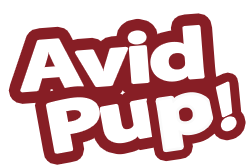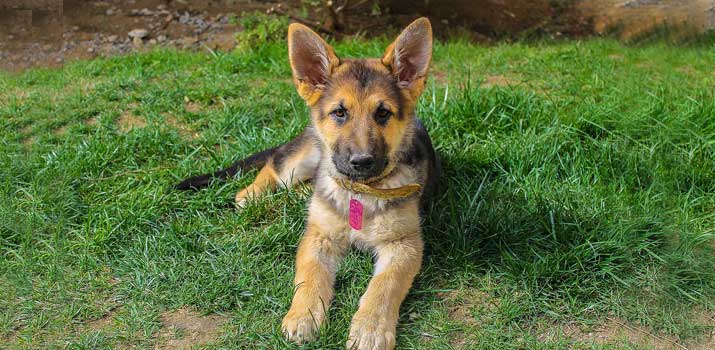
German Shepherds are one of the most popular dog breeds in the world. It’s not hard to see why. Not only are they beautiful, but these dogs are also smart, loyal, and energetic.
When they’re puppies, German Shepherds are playful little creatures that are curious about the world around them.
During the first year or so of life, your little puppy is going to go through a major growth spurt. Puppies start out at around one pound when they’re first born. Yet, by the time they are a year old, they can weight over 60 pounds!
To support that growth, you need to provide your pup with a healthy diet that’s filled with beneficial nutrients.
As a large breed, you need to be extra cautious about what you’re feeding your dog. Poor nutrition at a young age can result in some serious health complications in the future.
For German Shepherds, those risks are even higher due to the many conditions the breed is susceptible to.
Luckily, there’s no shortage of great dog food options on the market. Here’s a collection of some of the best wet and dry dog food for German Shepherd puppies.
7 of the Best Dog Foods for German Shepherd Puppies
1. Blue Buffalo Wilderness High Protein Large Breed Dry Puppy Food

This recipe from Blue Buffalo is a great option that has everything your puppy needs to stay healthy. Its protein content is 35 percent, which is well above the recommended amount.
Most of that protein comes from wholesome meat sources like deboned chicken and fish. While the kibble has more fat than your pup needs, it’s all good fat.
The omega fatty acids will keep your dog’s fur healthy while also supporting ocular health.
When it comes to minerals, you’ll be happy to know that this kibble offers the recommended calcium and phosphorus ratio of 1.2:1.
2. Hill’s Science Large Breed Puppy Diet, Chicken Meal & Oats Recipe
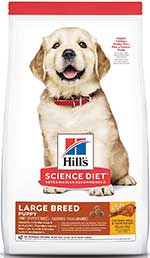
Specially formulated for large breed puppies like the German Shepherd, this Hill’s Science Diet dog food is a great option for your pup.
It’s made to provide controlled bone and joint growth. It does this with optimum levels of calcium and phosphorus. It’s also filled with healthy antioxidants to improve cell function and immune health.
Minerals help to make your dog’s teeth strong while DHA supports brain development.
As for protein, the kibble is made up of about 26 percent. It comes from chicken meal.
3. ORIJEN Dry Dog Food, Puppy Large, Biologically Appropriate & Grain Free
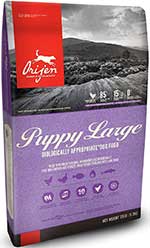
As it says right on the packaging, this option from Orijen is biologically appropriate dog food. It’s designed to meet the nutritional needs of large puppies without giving them any unnecessary extras.
You won’t find any potentially harmful additives or plant proteins. Instead, it has healthy meat and carbs.
Protein makes up 38 percent of the recipe. It comes from an array of meat sources, including chicken, turkey, fish, meat organs, and more.
There’s also plenty of complex carbs to give your dog a constant supply of energy. To make sure that their bones grow in a healthy way, it has that magic 1.2:1 ratio of calcium and phosphorus.
4. Royal Canin German Shepherd Puppy Dry Dog Food

This dry puppy food from Royal Canin is made exclusively for German Shepherds. It meets the breed’s unique health and nutrition needs.
The food is suitable for dogs as old as 15 weeks and addresses many common health issues. To combat digestive problems, it has probiotics that introduce beneficial flora into your pup’s gut.
To avoid joint and bone issues, it has a healthy dose of calcium and phosphorus.
Finally, it has a good blend of antioxidants to enhance your pup’s vulnerable immune system.
5. Instinct by Nature’s Variety Raw Boost Large Breed Puppy Recipe
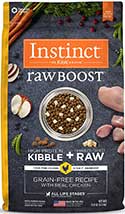
Advertised as the “raw brand,” Instinct dog food is all about providing pups with a diet that consists of wholesome ingredients. The Raw Boost large puppy food is no different.
It has 33.5 percent protein that comes from chicken, turkey meal, lamb meal, and more. Small bits of freeze-dried raw meat are thrown into the mix as well for an extra boost of muscle-building protein.
The recipe uses complex carbs and a variety of plant-based ingredients as well. They act as a source of vitamins and minerals that help your dog’s growing body.
Wet Canned Food for German Shepherd Puppies
1. Blue Buffalo Wilderness High Protein Grain Free, Natural Puppy Wet Dog Food
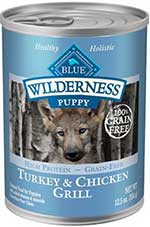
The high-protein and grain-free wet food from Blue Buffalo is a great first introduction to solid foods for your pup. It contains DHA for proper brain and eye development.
DHA is found naturally in milk, so it helps to make the transition as smooth as possible.
The canned food is comprised of chicken and chicken liver. The meat ingredients are paired with potatoes and pea protein. It’s all swimming in a delicious chicken broth that your pup will love.
In total, the food has 10.5 percent protein and 7 percent fat. There is no corn, wheat, or soy ingredients, ensuring that your pup starts off on the right foot.
2. Blue Freedom Puppy Grain Free Chicken Wet Dog Food
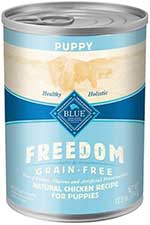
Also from Blue Buffalo is the Freedom formula. It’s a grain-free formula that can do wonders for your puppy’s overall health.
Real chicken is used as the primary protein source.
It’s accompanied by chicken liver and chicken broth. When you open the can, you’ll notice the visible vegetables. The food has carrots and peas, which provide plenty of vitamins and minerals.
There’s also sweet potato. It acts as the source of carbs to keep your dog’s energy levels consistent throughout the day. The potatoes also provide a dose of fiber for better digestive health.
What Makes a Good German Shepherd Puppy Food?
The needs of a puppy are much different than that of an adult dog. Your pup is growing rapidly right before your eyes. Their bones are getting stronger and their muscles are being primed for a lifetime of activity.
As a result, your puppy is actually going to need more nutrients now than they will when they get older.
To ensure that you’re giving your dog everything they need, here are some things to look for in your pup’s dog food.
Many of this information is recommended and regulated by the Association of American Feed Control.
You can look out for the small AAFO seal of approval on the packaging as a quick way to determine if a food is suitable for your dog.
High Protein Content
The most important thing your dog will need as both a puppy and an adult is protein. Protein is responsible for muscle growth and energy.
The AAFCO recommends that German Shepherd puppies eat a diet that consists of at least 22 percent protein.
This is higher than the 18 percent that adults need. However, we recommend going as high as 27 percent.
You can’t go wrong with more protein, so try to get the best food possible. Look out for ingredients like chicken, beef, lamb, and fish. Meat meals are also acceptable.
As long as the protein is identified, it can benefit your pup.
Avoid choosing foods that have byproducts or unlabeled mystery meats. They can do more harm than good.
Healthy Fats
Fat plays a couple of different roles in your pup’s body. First, it acts as a source of energy. Fat is converted into usable glucose, which provides an ongoing supply of energy.
Secondly, fat can support the circulatory system and skin health. However, this only applies to healthy fats.
Omega fatty acids work to keep the skin supple and improve blood circulation throughout the body. One specific type of omega fatty acid, DHA, can even support the development of the brain and eyes.
This type of fat comes ingredients like flaxseed and salmon oil.
It’s recommended that German Shepherd puppies have a diet that’s made up of 8 percent fat. Once your dog reached adulthood, you can lower that amount to 5 percent.
Calcium and Phosphorus
Calcium and phosphorus are crucial for proper bone and joint development. Puppies need just the right amount of these minerals to stay healthy.
Eating too much can lead to skeletal deformities and unhealthy growth spurts. Too little and your dog runs the risk of developing bone spurs and other ailments in the future.
The most common issues that plague this breed are hip dysplasia and arthritis. With hip dysplasia, the bones in the hip joint did not form correctly.
This leads to immense pain and difficulties in walking.
Unfortunately, the condition can remain undetected until your dog is older. Having the right amount of calcium and phosphorus can do a lot to prevent the condition.
Calcium is typically derived from dairy products or eggs.
Phosphorus is found in meat products and organs.
When you’re looking at dog food formulas, the important thing you need to pay attention to is the ratio of these ingredients. German Shepherd puppies need to have 1 part of phosphorus for every 1.2 parts of calcium.
As long as the food has this ratio, it should be good for your pup.
Complex Carbs
Carbohydrates are a source of energy for dogs. There are no guidelines when it comes to the amount of carbs needed for pups to stay healthy.
What’s important is the source of those carbs.
Cheaper dog foods use fillers like corn, wheat, and soy. These should be avoided. They’re difficult for your puppy’s delicate digestive system to process.
Many dogs are also allergic to them, so it’s best to avoid the ingredients altogether.
Healthy alternatives include sweet potatoes, peas, and whole oats. These are all considered to be complex carbs. They have a low glycemic index, which means that they are absorbed slowly throughout the day rather than all at once.
Complex carbohydrates also act as a healthy source of fiber. A high-fiber diet can introduce healthy bacteria into your dog’s gut to keep them regular.
How Often Should You Feed a German Shepherd Puppy?
You’ll be surprised by how much your puppy will eat. Despite their small size as young dogs, they can pack away a lot of food. The moment they are weaned off their mother’s milk, you should be feeding them three or four small meals every day.
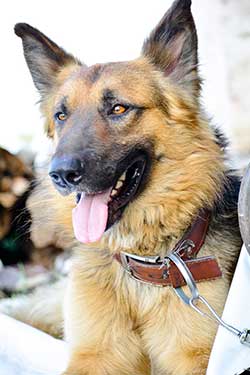
The meals need to split up to ensure that your dog can process everything before they eat again.
It’s not recommended that you free feed German Shepherd puppies. The breed is susceptible to excessive weight gain and obesity.
Your dog needs to gain weight in a healthy manner. Otherwise, they can develop musculoskeletal problems.
Furthermore, Bloat is a serious risk. Bloat occurs when dogs eat too much food too fast. Air gets trapped in their stomach, causing it to twist.
It’s a potentially fatal condition that can be avoided by simply managing how your pup eats.
At around six months old, you can start to transition to two meals a day.
You should maintain that schedule throughout your dog’s life. The amount of food you feed your dog will depend on their body condition and the calorie content of the food.
Follow the guidelines on the packaging and consult with your vet to see what your pup needs.
Which is Better: Wet or Dry Food?
Wet and dry food both have their advantages. Wet food is great for younger puppies that aren’t capable of chewing kibble just yet.
Once your dog is weaned off their mother, you should start them off with canned food.
The smooth texture is easier for them to get down and won’t provide as much of shock to their system as kibble would Keep them on the wet food as their digestive system gets stronger.
At 12 weeks of age, start to add in kibble. Let the juices of the food soften the kibble pieces so that it’s easy to eat.
Slowly take away the canned food and proceed with the dry kibble for their daily meals.
Kibble is your best bet as your dog gets older. Not only is more nutritionally dense than canned food, but dry food also has the added benefit of scrubbing their teeth as they chew.
Canned food should be used as a supplement only.
It has a lot more moisture than kibble. So, your dog will need to eat more of it to get all the fuel they need. It should be reserved for dogs with dental issues or those who have difficulties eating normal kibble.
Conclusion
Don’t let a poor diet affect your dog’s health for the rest of their life. By choosing a high-quality canned food and kibble, you can support their growing body and set them up for a healthy life ahead
Also Read: Best Dog Food for Beagles

